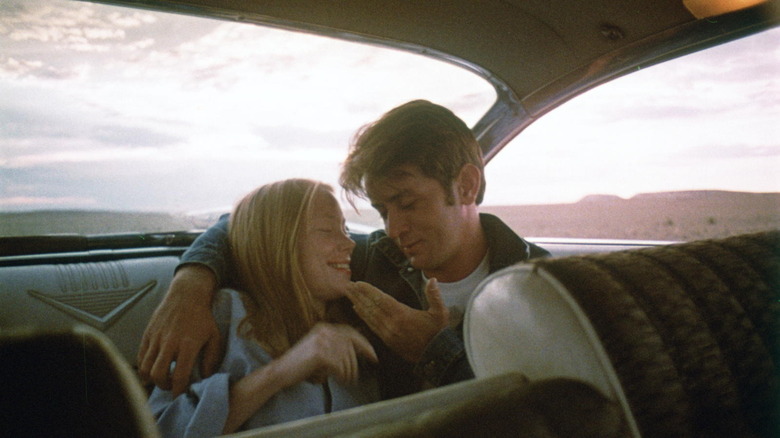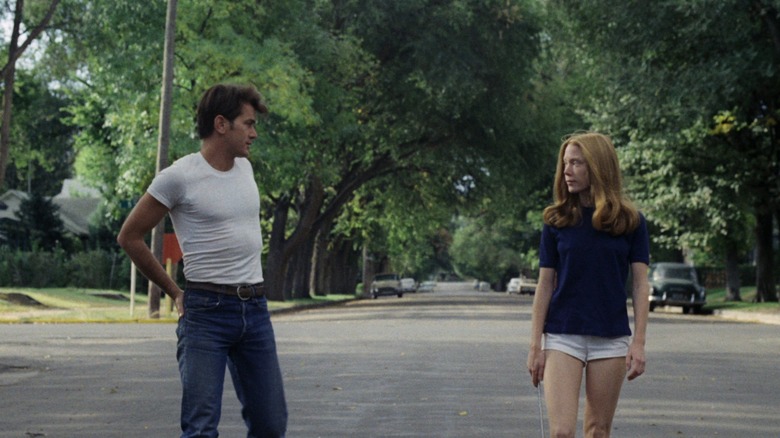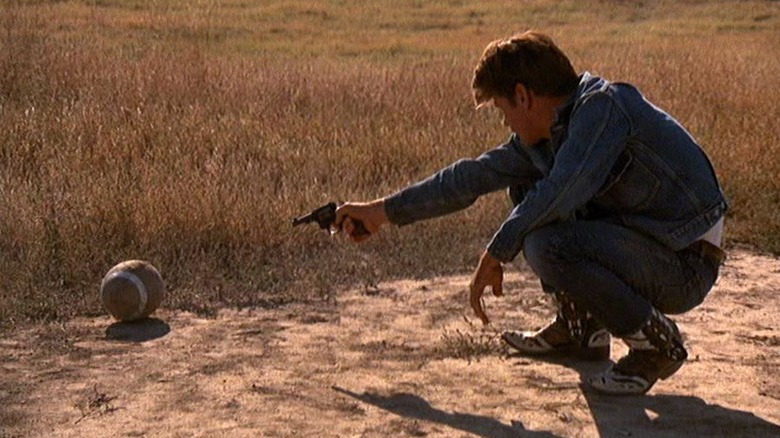Terrence Malick Was Battling Constant Pressure Behind The Scenes Of Badlands
Terrence Malick was fresh out of American Film Institute at the outset of the 1970s — along with Paul Schrader and Caleb Deschanel, he was one of its very first graduates — when he made a splash as a screenwriter, albeit uncredited, with drafts for "Dirty Harry" and Jack Nicholson's "Drive, He Said." He was clearly a major talent, but his first effort as a writer-director, "Badlands," an eerily enchanting young-outlaws-on-the-run drama starring Martin Sheen and Sissy Spacek, was anything but a safe bet. As a result, he had to raise half of the budget by hitting up doctors and dentists, while kicking in $25,000 of his own money.
The other half of the budget was supplied by a young, up-and-coming producer named Edward Pressman. He was as new to the business as Malick, but, being the heir to a toy marble fortune, he had cash to burn. Still, Pressman didn't want one of his first ventures, led by a tyro filmmaker, to go soaring over budget, so he sicced Louis Stroller, an associate producer with five years of experience as an AD on studio productions like "Charly," "Take the Money and Run" and "They Might Be Giants," on his director to make sure days were made and the money was spent wisely. Stroller did as charged, but not without catching some hands.
Don't mess with Texans
According to a GQ oral history on the making of "Badlands," Malick had to contend with numerous crew members determined to force the filmmaker down a conventional path. Joan Mocine, who worked in the art department, recalls, "[T]here were people trying to take advantage of Terry because he'd never done a movie before. They would say, 'You can't do this,' or 'There's not enough light for that.' Terry would say, 'I want to do it anyway.'"
Enter Stroller, who, per production manager Bill Scott, was Pressman's "cop." The associate producer rode Malick pretty hard, but Scott understood his function:
"Lou's approach was 'Here's how the big boys do it,' and he was absolutely right in many cases. But frequently those directives would conflict with something Terry wanted to do. A lot of times, to be quite honest, it's because Terry didn't know the right way, because he hadn't done it enough. And I didn't, and a lot of us didn't. Lou was the one guy who did."
Malick had a vocal ally on the set in his wife, Jill Jakes. She was a lawyer, and, per the shoot's best boy, Douglas Knapp, was quick to conflict if she felt Malick's vision was in any way getting compromised. Jakes could hold her own, which evidently peeved Stroller to the extent that he let fly an unkind comment in her direction. Malick heard this, and, being a Texan, was ready to rumble on behalf of his wife's honor, which did not go well for Stroller.
Louis Stroller takes a beating
Martin Sheen was there, and remembers the dust-up fondly:
"[T]erry was not having it, and beat the hell out of him. In true Texas style — he was so Texas. Didn't even hesitate, just started swinging. They were down like two buffalo — they were big guys — and they were on the ground, rolling around, and Terry just whupped him. Oh, I acted outraged — 'What a breakdown of discipline, this fighting on the set!' — but I couldn't have been prouder of him. Can you imagine? If more directors would beat up their producers, we'd have a lot more artistic freedom."
Producers might take the contrary view (imagine how many films would bankrupt companies if directors could pummel their way through an expensively protracted production), but there is something highly amusing about a money-minder taking a beating in the name of art. And "Badlands" is art. It's a woozy daydream of true love and psychosis that ends aloft, poised between the clouds as the sun drifts out of view, where it belongs. You don't walk out of "Badlands," you wake up from it.


